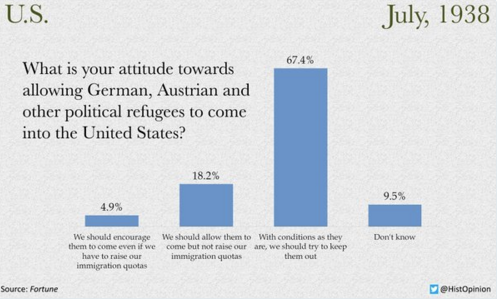History repeats itself? Before World War II, most Americans didn't want to accept Jewish refugees


A free daily email with the biggest news stories of the day – and the best features from TheWeek.com
You are now subscribed
Your newsletter sign-up was successful
There are, of course, enormous differences between the modern day Middle Eastern refugee crisis and the plight of German Jews in the years leading up to World War II. However, there is also at least one piece of common ground the two refugee crises share — suspicion and shuttered doors from Americans.
According to a public opinion poll that was published in Fortune magazine in July 1938, fewer than 5 percent of Americans surveyed at the time thought "we should encourage [Jewish political refugees] to come, even if we have to raise our immigration quotas," The Washington Post reports. In fact, 67.4 percent of Americans believed that "with conditions as they are, we should try to keep [the refugees] out."
By January 1939, sentiments hadn't much changed — even after the horrific events of Kristallnacht, which left over 91 Jews murdered and 1,000 synagogues burned. Asked if the United States should permit 10,000 Jewish refugee children from Germany into the country, 61 percent of Americans said no.
The Week
Escape your echo chamber. Get the facts behind the news, plus analysis from multiple perspectives.

Sign up for The Week's Free Newsletters
From our morning news briefing to a weekly Good News Newsletter, get the best of The Week delivered directly to your inbox.
From our morning news briefing to a weekly Good News Newsletter, get the best of The Week delivered directly to your inbox.
At present, 27 state governors, all but one of them Republican, oppose letting Syrian refugees in to their states. Many Republican presidential candidates have also spoken out against President Obama's plan to accept 10,000 into the U.S. next year. As New Jersey Gov. Chris Christie (R-N.J.) said Monday, he would not even allow "3-year-old orphans" entry.
"Today's 3-year-old Syrian orphan, it seems, is 1939's German Jewish child," The Washington Post suggests.
A free daily email with the biggest news stories of the day – and the best features from TheWeek.com
Jeva Lange was the executive editor at TheWeek.com. She formerly served as The Week's deputy editor and culture critic. She is also a contributor to Screen Slate, and her writing has appeared in The New York Daily News, The Awl, Vice, and Gothamist, among other publications. Jeva lives in New York City. Follow her on Twitter.
-
 Colbert, CBS spar over FCC and Talarico interview
Colbert, CBS spar over FCC and Talarico interviewSpeed Read The late night host said CBS pulled his interview with Democratic Texas state representative James Talarico over new FCC rules about political interviews
-
 The Week contest: AI bellyaching
The Week contest: AI bellyachingPuzzles and Quizzes
-
 Political cartoons for February 18
Political cartoons for February 18Cartoons Wednesday’s political cartoons include the DOW, human replacement, and more
-
 ABC News to pay $15M in Trump defamation suit
ABC News to pay $15M in Trump defamation suitSpeed Read The lawsuit stemmed from George Stephanopoulos' on-air assertion that Trump was found liable for raping writer E. Jean Carroll
-
 Judge blocks Louisiana 10 Commandments law
Judge blocks Louisiana 10 Commandments lawSpeed Read U.S. District Judge John deGravelles ruled that a law ordering schools to display the Ten Commandments in classrooms was unconstitutional
-
 ATF finalizes rule to close 'gun show loophole'
ATF finalizes rule to close 'gun show loophole'Speed Read Biden moves to expand background checks for gun buyers
-
 Hong Kong passes tough new security law
Hong Kong passes tough new security lawSpeed Read It will allow the government to further suppress all forms of dissent
-
 France enshrines abortion rights in constitution
France enshrines abortion rights in constitutionspeed read It became the first country to make abortion a constitutional right
-
 Texas executes man despite contested evidence
Texas executes man despite contested evidenceSpeed Read Texas rejected calls for a rehearing of Ivan Cantu's case amid recanted testimony and allegations of suppressed exculpatory evidence
-
 Supreme Court wary of state social media regulations
Supreme Court wary of state social media regulationsSpeed Read A majority of justices appeared skeptical that Texas and Florida were lawfully protecting the free speech rights of users
-
 Greece legalizes same-sex marriage
Greece legalizes same-sex marriageSpeed Read Greece becomes the first Orthodox Christian country to enshrine marriage equality in law
